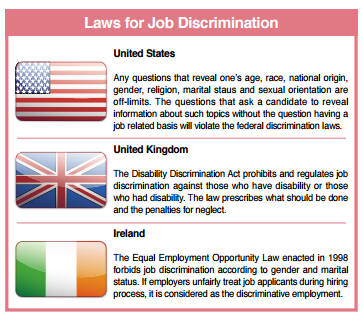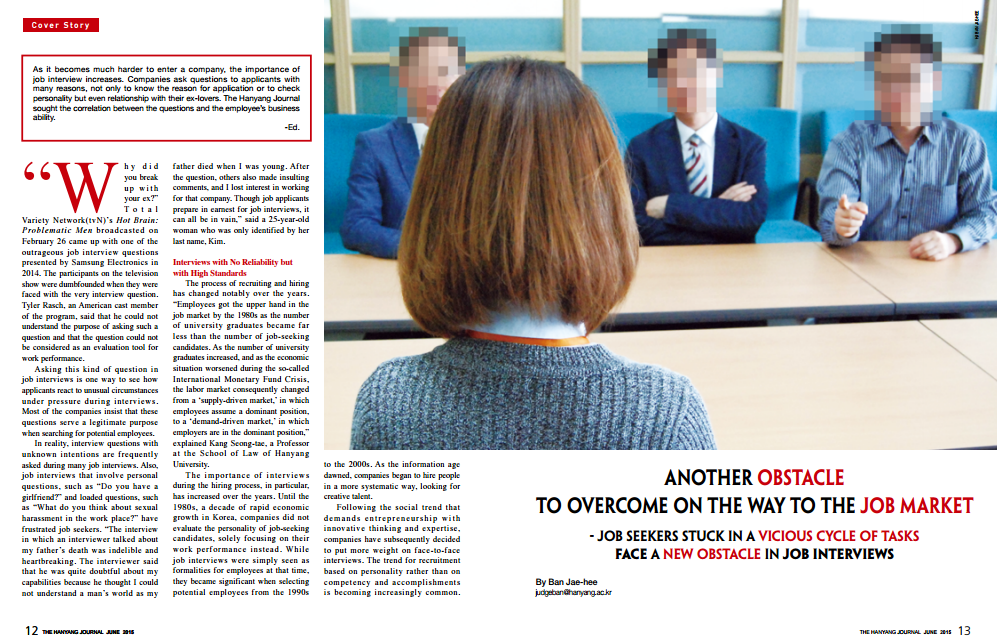
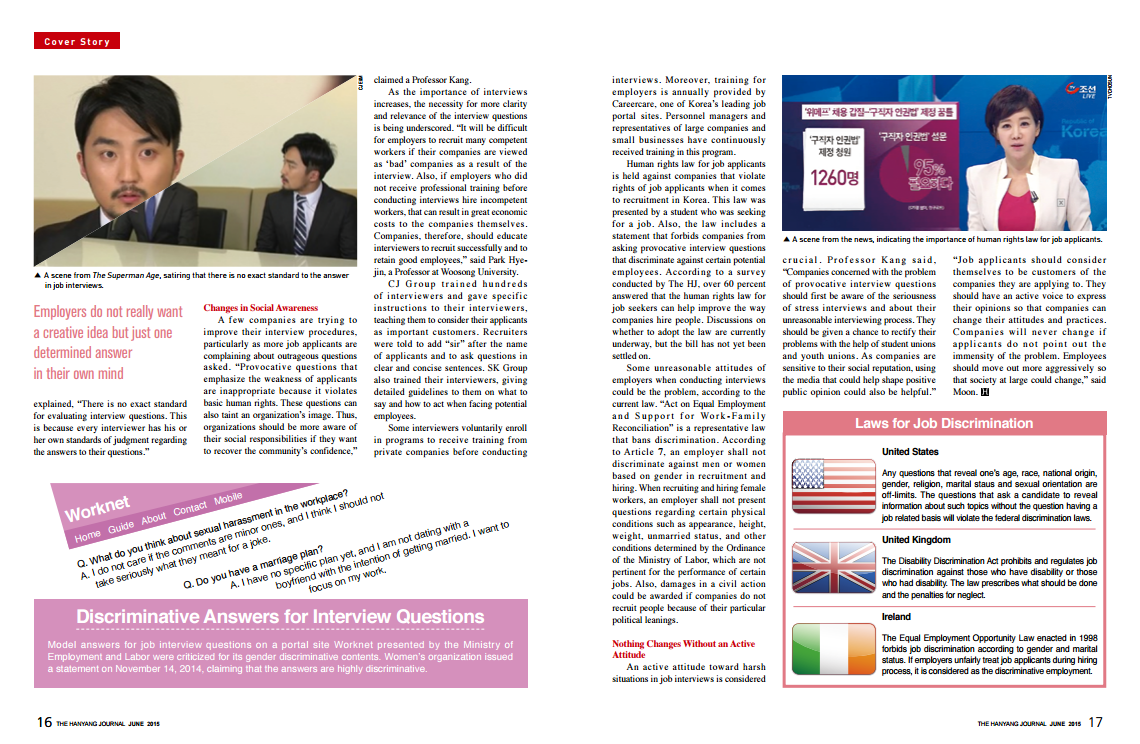
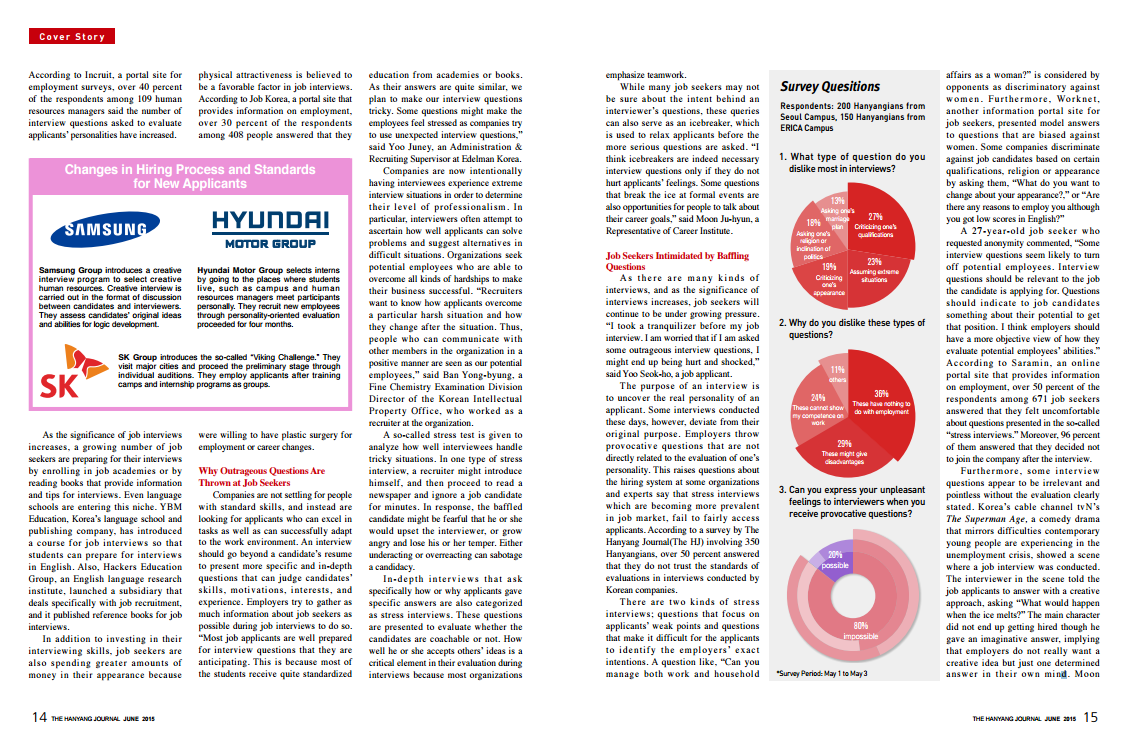
“Why did you break up with your ex?” Total Variety Network(tvN)’s Hot Brain: Problematic Men broadcasted on February 26 came up with one of the outrageous job interview questions presented by Samsung Electronics in 2014. The participants on the television show were dumbfounded when they were faced with the very interview question. Tyler Rasch, an American cast member of the program, said that he could not understand the purpose of asking such a question and that the question could not be considered as an evaluation tool for work performance.
Asking this kind of question in job interviews is one way to see how applicants react to unusual circumstances under pressure during interviews. Most of the companies insist that these questions serve a legitimate purpose when searching for potential employees.
In reality, interview questions with unknown intentions are frequently asked during many job interviews. Also, job interviews that involve personal questions, such as “Do you have a girlfriend?” and loaded questions, such as “What do you think about sexual harassment in the work place?” have frustrated job seekers. “The interview in which an interviewer talked about my father’s death was indelible and heartbreaking. The interviewer said that he was quite doubtful about my capabilities because he thought I could not understand a man’s world as my father died when I was young. After the question, others also made insulting comments, and I lost interest in working for that company. Though job applicants prepare in earnest for job interviews, it can all be in vain,” said a 25-year-old woman who was only identified by her last name, Kim.
Interviews with No Reliability but with High Standards
The process of recruiting and hiring has changed notably over the years. “Employees got the upper hand in the job market by the 1980s as the number of university graduates became far less than the number of job-seeking candidates. As the number of university graduates increased, and as the economic situation worsened during the so-called International Monetary Fund Crisis, the labor market consequently changed from a ‘supply-driven market,’ in which employees assume a dominant position, to a ‘demand-driven market,’ in which employers are in the dominant position,” explained Kang Seong-tae, a Professor at the School of Law of Hanyang University.
The importance of interviews during the hiring process, in particular, has increased over the years. Until the 1980s, a decade of rapid economic growth in Korea, companies did not evaluate the personality of job-seeking candidates, solely focusing on their work performance instead. While job interviews were simply seen as formalities for employees at that time, they became significant when selecting potential employees from the 1990s to the 2000s. As the information age dawned, companies began to hire people in a more systematic way, looking for creative talent.
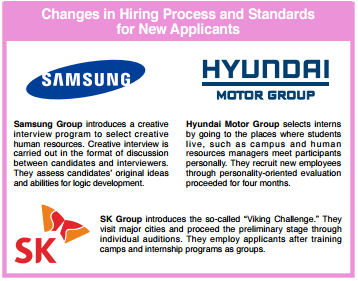
Following the social trend that demands entrepreneurship with innovative thinking and expertise, companies have subsequently decided to put more weight on face-to-face interviews. The trend for recruitment based on personality rather than on competency and accomplishments is becoming increasingly common. According to Incruit, a portal site for employment surveys, over 40 percent of the respondents among 109 human resources managers said the number of interview questions asked to evaluate applicants’ personalities have increased.
As the significance of job interviews increases, a growing number of job seekers are preparing for their interviews by enrolling in job academies or by reading books that provide information and tips for interviews. Even language schools are entering this niche. YBM Education, Korea’s language school and publishing company, has introduced a course for job interviews so that students can prepare for interviews in English. Also, Hackers Education Group, an English language research institute, launched a subsidiary that deals specifically with job recruitment, and it published reference books for job interviews.
In addition to investing in their interviewing skills, job seekers are also spending greater amounts of money in their appearance because physical attractiveness is believed to be a favorable factor in job interviews. According to Job Korea, a portal site that provides information on employment, over 30 percent of the respondents among 408 people answered that they were willing to have plastic surgery for employment or career changes.
Why Outrageous Questions Are Thrown at Job Seekers
Companies are not settling for people with standard skills, and instead are looking for applicants who can excel in tasks as well as can successfully adapt to the work environment. An interview should go beyond a candidate’s resume to present more specific and in-depth questions that can judge candidates’ skills, motivations, interests, and experience. Employers try to gather as much information about job seekers as possible during job interviews to do so. “Most job applicants are well prepared for interview questions that they are anticipating. This is because most of the students receive quite standardized education from academies or books. As their answers are quite similar, we plan to make our interview questions tricky. Some questions might make the employees feel stressed as companies try to use unexpected interview questions,” said Yoo Juney, an Administration & Recruiting Supervisor at Edelman Korea.
Companies are now intentionally having interviewees experience extreme interview situations in order to determine their level of professionalism. In particular, interviewers often attempt to ascertain how well applicants can solve problems and suggest alternatives in difficult situations. Organizations seek potential employees who are able to overcome all kinds of hardships to make their business successful. “Recruiters want to know how applicants overcome a particular harsh situation and how they change after the situation. Thus, people who can communicate with other members in the organization in a positive manner are seen as our potential employees,” said Ban Yong-byung, a Fine Chemistry Examination Division Director of the Korean Intellectual Property Office, who worked as a recruiter at the organization.
A so-called stress test is given to analyze how well interviewees handle tricky situations. In one type of stress interview, a recruiter might introduce himself, and then proceed to read a newspaper and ignore a job candidate for minutes. In response, the baffled candidate might be fearful that he or she would upset the interviewer, or grow angry and lose his or her temper. Either underacting or overreacting can sabotage a candidacy.
In-depth interviews that ask specifically how or why applicants gave specific answers are also categorized as stress interviews. These questions are presented to evaluate whether the candidates are coachable or not. How well he or she accepts others’ ideas is a critical element in their evaluation during interviews because most organizationsemphasize teamwork.
While many job seekers may not be sure about the intent behind an interviewer’s questions, these queries can also serve as an icebreaker, which is used to relax applicants before the more serious questions are asked. “I think icebreakers are indeed necessary interview questions only if they do not hurt applicants’ feelings. Some questions that break the ice at formal events are also opportunities for people to talk about their career goals,” said Moon Ju-hyun, a Representative of Career Institute.
Job Seekers Intimidated by Baffling Questions
As there are many kinds of interviews, and as the significance of interviews increases, job seekers will continue to be under growing pressure. “I took a tranquilizer before my job interview. I am worried that if I am asked some outrageous interview questions, I might end up being hurt and shocked,” said Yoo Seok-ho, a job applicant.
The purpose of an interview is to uncover the real personality of an applicant. Some interviews conducted these days, however, deviate from their original purpose. Employers throw provocative questions that are not directly related to the evaluation of one’s personality. This raises questions about the hiring system at some organizations and experts say that stress interviews which are becoming more prevalent in job market, fail to fairly access applicants. According to a survey by The Hanyang Journal(The HJ) involving 350 Hanyangians, over 50 percent answered that they do not trust the standards of evaluations in interviews conducted by Korean companies.
There are two kinds of stress interviews; questions that focus on applicants’ weak points and questions that make it difficult for the applicants to identify the employers’ exact intentions. A question like, “Can you manage both work and householdaffairs as a woman?” is considered by opponents as discriminatory against women. Furthermore, Worknet, another information portal site for job seekers, presented model answers to questions that are biased against women. Some companies discriminate against job candidates based on certain qualifications, religion or appearance by asking them, “What do you want to change about your appearance?,” or “Are there any reasons to employ you although you got low scores in English?”

A 27-year-old job seeker who requested anonymity commented, “Some interview questions seem likely to turn off potential employees. Interview questions should be relevant to the job the candidate is applying for. Questions should indicate to job candidates something about their potential to get that position. I think employers should have a more objective view of how they evaluate potential employees’ abilities.” According to Saramin, an online portal site that provides information on employment, over 50 percent of the respondents among 671 job seekers answered that they felt uncomfortable about questions presented in the so-called “stress interviews.” Moreover, 96 percent of them answered that they decided not to join the company after the interview.
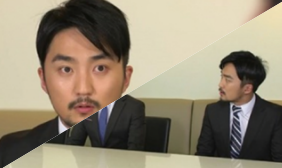
Furthermore, some interview questions appear to be irrelevant and pointless without the evaluation clearly stated. Korea’s cable channel tvN’s The Superman Age, a comedy drama that mirrors difficulties contemporary young people are experiencing in the unemployment crisis, showed a scene where a job interview was conducted. The interviewer in the scene told the job applicants to answer with a creative approach, asking “What would happen when the ice melts?” The main character did not end up getting hired though he gave an imaginative answer, implying that employers do not really want a creative idea but just one determined answer in their own mind. Moon for evaluating interview questions. This is because every interviewer has his or her own standards of judgment regarding the answers to their questions.”
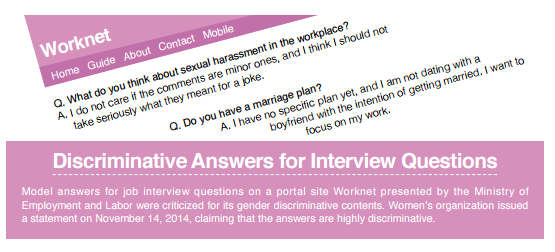
Changes in Social Awareness
A few companies are trying to improve their interview procedures, particularly as more job applicants are complaining about outrageous questions asked. “Provocative questions that emphasize the weakness of applicants are inappropriate because it violates basic human rights. These questions can also taint an organization’s image. Thus, organizations should be more aware of their social responsibilities if they want to recover the community’s confidence,” claimed a Professor Kang.
As the importance of interviews increases, the necessity for more clarity and relevance of the interview questions is being underscored. “It will be difficult for employers to recruit many competent workers if their companies are viewed as ‘bad’ companies as a result of the interview. Also, if employers who did not receive professional training before conducting interviews hire incompetent workers, that can result in great economic costs to the companies themselves. Companies, therefore, should educate interviewers to recruit successfully and to retain good employees,” said Park Hyejin, a Professor at Woosong University.
CJ Group trained hundreds of interviewers and gave specific instructions to their interviewers, teaching them to consider their applicants as important customers. Recruiters were told to add “sir” after the name of applicants and to ask questions in clear and concise sentences. SK Group also trained their interviewers, giving detailed guidelines to them on what to say and how to act when facing potential employees.
Some interviewers voluntarily enroll in programs to receive training from private companies before conducting interviews. Moreover, training for employers is annually provided by Careercare, one of Korea’s leading job portal sites. Personnel managers and representatives of large companies and small businesses have continuously received training in this program.
Human rights law for job applicants is held against companies that violate rights of job applicants when it comes to recruitment in Korea. This law was presented by a student who was seeking for a job. Also, the law includes a statement that forbids companies from asking provocative interview questions that discriminate against certain potential employees. According to a survey conducted by The HJ, over 60 percent answered that the human rights law for job seekers can help improve the way companies hire people. Discussions on whether to adopt the law are currently underway, but the bill has not yet been settled on.
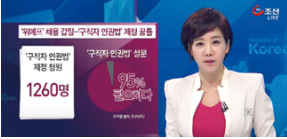
Some unreasonable attitudes of employers when conducting interviews could be the problem, according to the current law. “Act on Equal Employment and Support for Work - Family Reconciliation” is a representative law that bans discrimination. According to Article 7, an employer shall not discriminate against men or women based on gender in recruitment and hiring. When recruiting and hiring female workers, an employer shall not present questions regarding certain physical conditions such as appearance, height, weight, unmarried status, and other conditions determined by the Ordinance of the Ministry of Labor, which are not pertinent for the performance of certain jobs. Also, damages in a civil action could be awarded if companies do not recruit people because of their particular political leanings.
Nothing Changes Without an Active Attitude
An active attitude toward harsh situations in job interviews is considered crucial. Professor Kang said, “Companies concerned with the problem of provocative interview questions should first be aware of the seriousness of stress interviews and about their unreasonable interviewing process. They should be given a chance to rectify their problems with the help of student unions and youth unions. As companies are sensitive to their social reputation, using the media that could help shape positive public opinion could also be helpful.” “Job applicants should consider themselves to be customers of the companies they are applying to. They should have an active voice to express their opinions so that companies can change their attitudes and practices. Companies will never change if applicants do not point out the immensity of the problem. Employees should move out more aggressively so that society at large could change,” said Moon.
